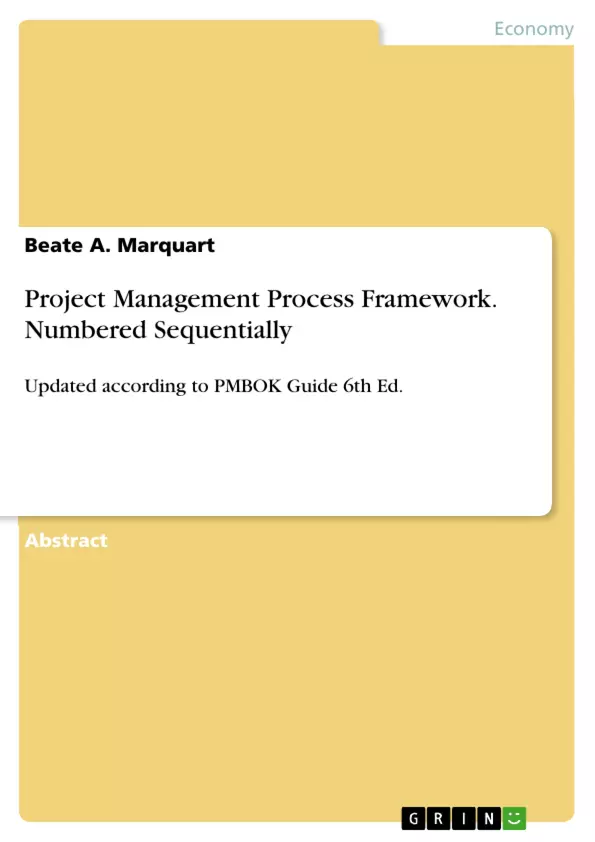Before preparing a lesson, every teacher must consider the essential question of whether to present and teach project management according to knowledge areas or according to the project lifecycle. Perhaps this is a simple question, but literature about Project Management Professional (PMP) certification or the PMBOK® Guide, A Guide to the Project Management Body of Knowledge, from Project Management Institute (PMI) offer both as options, depending on the target and the audience. The PMI project management process framework is arranged in a matrix with project processes and knowledge areas as the dimensions. While the PMBOK Guide explains the processes according to knowledge areas, this article gives an overview of them numbered sequentially in groups. The order according to knowledge areas is well known, but this article shows the storyline of the processes ordered according to the theoretical project lifecycle.
Inhaltsverzeichnis (Table of Contents)
- Introduction
- Objective
- Initiating
- Process 1.1: Develop Project Charter
- Process 1.2: Identify Stakeholders
- Planning
- Process 2.1: Develop Project Management Plan
- Process 2.2: Plan Scope Management
- Process 2.3: Collect Requirements
- Process 2.4: Define Scope
- Process 2.5: Create WBS
- Process 2.6: Plan Schedule Management
- Process 2.7: Define Activities
- Process 2.8: Sequence Activities
- Process 2.9: Estimate Activity Durations
- Process 2.10: Develop Schedule
- Process 2.11: Plan Cost Management
- Process 2.12: Estimate Costs
- Process 2.13: Determine Budget
- Process 2.14: Plan Quality Management
- Process 2.15: Plan Resource Management
- Process 2.16: Estimate Activity Resources
- Process 2.17: Plan Communications Management
- Process 2.18: Plan Risk Management
- Process 2.19: Identify Risks
- Process 2.20: Perform Qualitative Risk Analysis
- Process 2.21: Perform Quantitative Risk Analysis
- Process 2.22: Plan Risk Response
- Process 2.23: Plan Procurement Management
- Process 2.24: Plan Stakeholder Engagement
- Executing
- Monitoring and Controlling
- Closing
- Conclusions
- References
Zielsetzung und Themenschwerpunkte (Objectives and Key Themes)
This article outlines the project management process framework as defined by the PMBOK® Guide, sixth Edition, and provides a sequential overview of the processes within each process group. The aim is to clarify the storyline of the project management process framework, facilitating understanding and application for both newcomers and experienced project managers.
- The PMBOK® Guide as a framework for project management.
- Sequential ordering of project management processes.
- The role of process groups in the project lifecycle.
- The importance of planning and control in project management.
- The various processes involved in project initiation, planning, execution, monitoring, controlling, and closing.
Zusammenfassung der Kapitel (Chapter Summaries)
The introduction establishes the context for this article, outlining the importance of understanding the PMBOK® Guide and its process framework. The article then presents a sequential ordering of the 49 processes within the framework, starting with the Initiating process group.
The Initiating process group encompasses two key processes: Develop Project Charter and Identify Stakeholders. The first process focuses on defining the project's goals, budget, and responsibilities, while the second involves identifying and analyzing all stakeholders who may impact the project.
The Planning process group, which follows the Initiating process group, comprises 24 processes. It involves collecting data and objectives to define the project details in a comprehensive project management plan. These processes cover aspects such as scope management, requirement collection, schedule management, cost management, risk management, procurement, and stakeholder engagement.
Schlüsselwörter (Keywords)
The key terms and concepts explored in this article are project management process framework, PMBOK® Guide, process groups, project lifecycle, initiating, planning, executing, monitoring, controlling, closing, project charter, stakeholders, project management plan, scope management, schedule management, cost management, risk management, procurement, stakeholder engagement.
Frequently Asked Questions
What is the project management process framework described in this article?
It is a framework based on the PMBOK® Guide (6th Edition) that organizes 49 project management processes into a sequential storyline according to the project lifecycle.
How does the sequential ordering differ from the PMBOK Guide?
While the PMBOK Guide typically explains processes by knowledge areas, this article groups and numbers them sequentially to show the logical flow from start to finish.
What are the key processes in the Initiating phase?
The two key processes are Develop Project Charter (defining goals and responsibilities) and Identify Stakeholders (analyzing those who impact the project).
How many processes are part of the Planning group?
The Planning process group is the largest, comprising 24 individual processes covering scope, schedule, cost, risk, and more.
What are the five main process groups in the project lifecycle?
The framework is divided into Initiating, Planning, Executing, Monitoring and Controlling, and Closing.
Who is the target audience for this process framework?
The article is designed for both newcomers to project management and experienced professionals seeking a better understanding of the process storyline.
- Arbeit zitieren
- Beate A. Marquart (Autor:in), 2017, Project Management Process Framework. Numbered Sequentially, München, GRIN Verlag, https://www.grin.com/document/379701



